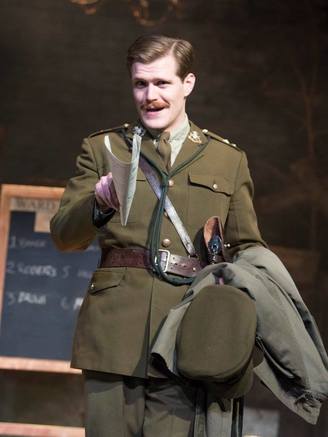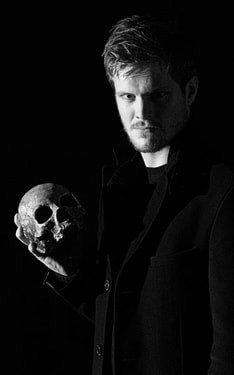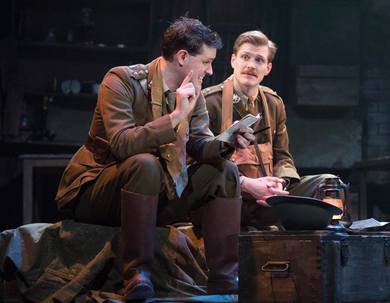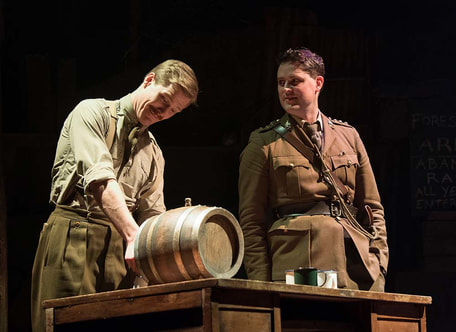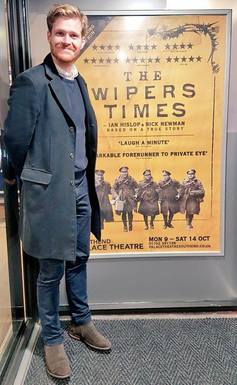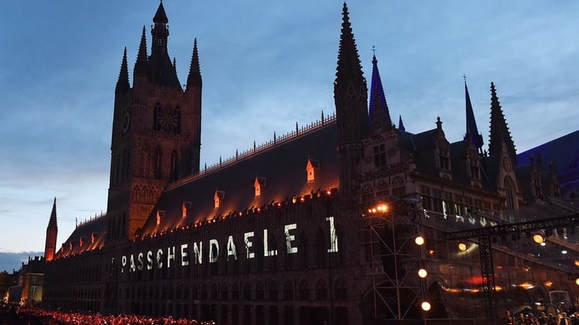INTERVIEW
with Southend's
GEORGE KEMP
starring as Jack Pearson in
Ian Hislop and Nick Newman's
WIPERS TIMES
coming to
Palace Theatre, Westcliff on Sea
9th - 14th October 2017
with Southend's
GEORGE KEMP
starring as Jack Pearson in
Ian Hislop and Nick Newman's
WIPERS TIMES
coming to
Palace Theatre, Westcliff on Sea
9th - 14th October 2017
Following a sold-out UK tour in 2016, and a critically acclaimed hit run at the Arts Theatre in the West End, The Wipers Times will once again tour the UK this autumn.
Ian Hislop and Nick Newman’s The Wipers Times is a stage adaptation of their award-winning BBC film. It tells the true and extraordinary story of the satirical newspaper created in the mud and mayhem of the Somme, interspersed with comic sketches and spoofs from the vivid imagination of those on the front line.
One member of the cast who will be especially looking forward to coming to Southend's Palace Theatre on Monday 9th October will be George Kemp who was born in Southend and brought up in Leigh on Sea.
I catch up with George, 26, just before he heads off to Cardiff where the tour kicks off and he starts by telling me that the acting bug was something which was instilled in him from his days as a pupil at Southend High School for Boys.
“I had an amazing drama teacher there called Mark Valencia, who’s retired now." he tells me. "He was wonderful and used to take us to the most amazing shows. Some were the big hitters that everybody sees but also to some really out of the way companies like Complicite and Punch Drunk - it was a great education. He used to put on really great shows as well; we did Les Miserables and I played lots of little parts in that - my singing wasn’t up to much then - it’s better now!”
Saturday morning drama classes led to George working for ‘theatre in education’ company, Outloud Productions, whilst also holding down a job in London as well as performing with Southend based sketch group, Giraffe. During this time George also found himself performing with local am dram groups, Southend Shakespeare Company and Little Theatre Company.
Ian Hislop and Nick Newman’s The Wipers Times is a stage adaptation of their award-winning BBC film. It tells the true and extraordinary story of the satirical newspaper created in the mud and mayhem of the Somme, interspersed with comic sketches and spoofs from the vivid imagination of those on the front line.
One member of the cast who will be especially looking forward to coming to Southend's Palace Theatre on Monday 9th October will be George Kemp who was born in Southend and brought up in Leigh on Sea.
I catch up with George, 26, just before he heads off to Cardiff where the tour kicks off and he starts by telling me that the acting bug was something which was instilled in him from his days as a pupil at Southend High School for Boys.
“I had an amazing drama teacher there called Mark Valencia, who’s retired now." he tells me. "He was wonderful and used to take us to the most amazing shows. Some were the big hitters that everybody sees but also to some really out of the way companies like Complicite and Punch Drunk - it was a great education. He used to put on really great shows as well; we did Les Miserables and I played lots of little parts in that - my singing wasn’t up to much then - it’s better now!”
Saturday morning drama classes led to George working for ‘theatre in education’ company, Outloud Productions, whilst also holding down a job in London as well as performing with Southend based sketch group, Giraffe. During this time George also found himself performing with local am dram groups, Southend Shakespeare Company and Little Theatre Company.
|
“Southend Shakespeare Company was wonderful for me because I was just eating it up and they just threw the most amazing parts at me. Henry VI was my first one with them.” He continues, “Hamlet was pretty great and so was Henry V. I had a wonderful time with them and there are so many great actors in that company you can’t help but learn a lot by osmosis I think. The quality of their work is really good and they do quite interesting stuff.”
George tells me that he had a great time playing Joseph Cable in South Pacific with the Little Theatre Company and is appreciative of the experience gained during his time with both companies. “It was really valuable, before drama school, just going and doing different types of work. Great Shakespeare parts and working outdoors with the SSC and working in TIE.” |
George eventually decided that the time was right to try and get into drama school.
He explains, “I was on the train and genuinely had a moment of like, right, I need to stop wasting time now. The only drama school left open still was Guildhall so I applied there and managed to get on to their preliminary acting course which was a years part time foundation course.”
After two terms studying in the evenings at the Guildhall whilst working in London for Moss Bros during the day, George decided to audition for LAMDA and I ask him how he felt auditioning for such a prestigious drama school whose alumni include the likes of Jim Broadbent, Dominic Cooper, Kim Cattrall and Rory Kinnear.
“I’m glad that I waited until I was a bit older because I was less fazed by it.” He confesses, “It is nerve wracking because the competition is fierce and also you can’t help but feel like your future’s in the balance a bit.”
“Everyone does want it so much and it means so much but I think because I was 23 years old by then, I just thought, well whatever happens, happens and I wanted to go somewhere where I would be happy. Doing all that other work and Guildhall as well just bedded down my own skills and style so I was just a bit calmer I suppose,” he adds with a grin, “which obviously helped because I got in.”
He explains, “I was on the train and genuinely had a moment of like, right, I need to stop wasting time now. The only drama school left open still was Guildhall so I applied there and managed to get on to their preliminary acting course which was a years part time foundation course.”
After two terms studying in the evenings at the Guildhall whilst working in London for Moss Bros during the day, George decided to audition for LAMDA and I ask him how he felt auditioning for such a prestigious drama school whose alumni include the likes of Jim Broadbent, Dominic Cooper, Kim Cattrall and Rory Kinnear.
“I’m glad that I waited until I was a bit older because I was less fazed by it.” He confesses, “It is nerve wracking because the competition is fierce and also you can’t help but feel like your future’s in the balance a bit.”
“Everyone does want it so much and it means so much but I think because I was 23 years old by then, I just thought, well whatever happens, happens and I wanted to go somewhere where I would be happy. Doing all that other work and Guildhall as well just bedded down my own skills and style so I was just a bit calmer I suppose,” he adds with a grin, “which obviously helped because I got in.”
Before George had even graduated, he was given the opportunity to audition for The Wipers Times.
“I signed with my agent in February and then had an audition for The Wipers Times within the next couple of months, so I knew I was going off to do that before I left, which was lovely and a really privileged position to be in.”
Before the 2016 tour began, the play premiered at The Watermill Theatre in Newbury, a converted watermill of which George speaks fondly.
“It’s a lovely theatre. It feels like it’s got a lot of magic in the room and its curious as well because it looks small - when the house lights are on it looks tiny but when the show is up and running it gains loads of space. It’s a bit like a tardis in there - it does transform.”
I wonder how much interaction there was with the writers, Ian Hislop and Nick Newman, during the rehearsal period and George tells me that they have been pretty hands on.
“They were around quite a lot, which is lovely and also they are very good collaborators - they’re very kind with their time and advice. We’ve got to know them quite well.”
The play takes place in a bombed out building during the First World War in the Belgian town of Ypres (mispronounced Wipers by British soldiers), two officers discover a printing press and create a newspaper for the troops. Far from being a somber journal about life in the trenches they produced a resolutely cheerful, subversive and very funny newspaper designed to lift the spirits of the men on the frontline.
Defying enemy bombardment, gas attacks and the disapproval of many of the top Brass, The Wipers Times rolled off the press for two years and was an extraordinary tribute to the resilience of the human spirit in the face of overwhelming adversity.
“I signed with my agent in February and then had an audition for The Wipers Times within the next couple of months, so I knew I was going off to do that before I left, which was lovely and a really privileged position to be in.”
Before the 2016 tour began, the play premiered at The Watermill Theatre in Newbury, a converted watermill of which George speaks fondly.
“It’s a lovely theatre. It feels like it’s got a lot of magic in the room and its curious as well because it looks small - when the house lights are on it looks tiny but when the show is up and running it gains loads of space. It’s a bit like a tardis in there - it does transform.”
I wonder how much interaction there was with the writers, Ian Hislop and Nick Newman, during the rehearsal period and George tells me that they have been pretty hands on.
“They were around quite a lot, which is lovely and also they are very good collaborators - they’re very kind with their time and advice. We’ve got to know them quite well.”
The play takes place in a bombed out building during the First World War in the Belgian town of Ypres (mispronounced Wipers by British soldiers), two officers discover a printing press and create a newspaper for the troops. Far from being a somber journal about life in the trenches they produced a resolutely cheerful, subversive and very funny newspaper designed to lift the spirits of the men on the frontline.
Defying enemy bombardment, gas attacks and the disapproval of many of the top Brass, The Wipers Times rolled off the press for two years and was an extraordinary tribute to the resilience of the human spirit in the face of overwhelming adversity.
George speaks of the characters in the play, “It’s interesting - we don’t really know a lot about them and the only real-life characters are Captain Fred Roberts, who was in charge of that company of men and my character, Jack Pearson.”
However, they later discovered another of the characters was also real.
“The sergeant in the platoon was called Sergeant Tyler and they didn’t know he was real until someone unearthed a letter that he had sent back home saying that they’d started doing this thing [the paper]. He said if you get hold of a copy you should keep hold of it because it’s going to be worth something one day. And he was right.”
“The most we know about them are through their work, through the paper. You get a real sense of their voice in the jokes and the sketches and the adverts that they wrote.”
The cast got to meet the families of Roberts and Pearson when they came to watch the play and when Jack Pearson’s family came to the Arts Theatre in London, George admits that he felt the pressure that night.
“Fortunately everyone’s painted in quite a good light.”
I suggest to George that one of the great things about being an actor and doing research into your character is that you find out so much that you never would otherwise and he agrees.
“We keep finding out things as we go along. We went to Ypres to do the Passchendaele 100 Year Ceremony and we got to see their office in the ramparts around Ypres. The room in which they printed the paper is now a brewery where they brew the Wipers Times beer, so we got to have a drink in there. Research and beer - great!”
“They’ve still got the press in there, which is amazing. It’s huge, much bigger than ours in the show actually, but they found this press in what was a bombed out school room. I don’t know what they thought it would eventually turn in to but the idea was to print an enjoyable, periodical newspaper a bit like Punch. I think there were other trench newspapers that were going on at the time but the quality of the jokes and also the quality of the physical paper was much higher than lots of the other publications that were going on and so it has ended up as the most endurable of all of them. It’s a remarkable story.”
“I’ve learnt so much about the First World War which I didn’t know - it has been remarkable and you’re right, one of the real gifts of the job is the opportunity to be a bit of a detective about history and also about people. That’s one of the great things about it - not just working with lots of different great people but putting yourself in different mindsets and periods of history. We've all ended up learning a lot about that time - it’s been really fun and continues to be good fun.”
However, they later discovered another of the characters was also real.
“The sergeant in the platoon was called Sergeant Tyler and they didn’t know he was real until someone unearthed a letter that he had sent back home saying that they’d started doing this thing [the paper]. He said if you get hold of a copy you should keep hold of it because it’s going to be worth something one day. And he was right.”
“The most we know about them are through their work, through the paper. You get a real sense of their voice in the jokes and the sketches and the adverts that they wrote.”
The cast got to meet the families of Roberts and Pearson when they came to watch the play and when Jack Pearson’s family came to the Arts Theatre in London, George admits that he felt the pressure that night.
“Fortunately everyone’s painted in quite a good light.”
I suggest to George that one of the great things about being an actor and doing research into your character is that you find out so much that you never would otherwise and he agrees.
“We keep finding out things as we go along. We went to Ypres to do the Passchendaele 100 Year Ceremony and we got to see their office in the ramparts around Ypres. The room in which they printed the paper is now a brewery where they brew the Wipers Times beer, so we got to have a drink in there. Research and beer - great!”
“They’ve still got the press in there, which is amazing. It’s huge, much bigger than ours in the show actually, but they found this press in what was a bombed out school room. I don’t know what they thought it would eventually turn in to but the idea was to print an enjoyable, periodical newspaper a bit like Punch. I think there were other trench newspapers that were going on at the time but the quality of the jokes and also the quality of the physical paper was much higher than lots of the other publications that were going on and so it has ended up as the most endurable of all of them. It’s a remarkable story.”
“I’ve learnt so much about the First World War which I didn’t know - it has been remarkable and you’re right, one of the real gifts of the job is the opportunity to be a bit of a detective about history and also about people. That’s one of the great things about it - not just working with lots of different great people but putting yourself in different mindsets and periods of history. We've all ended up learning a lot about that time - it’s been really fun and continues to be good fun.”
|
The reviews from the last tour have been great and in particular for George who responds with a very modest, “Well, I don’t know about that. I’m just in it a lot so they feel that they have to say something about me.”
George says that the cast get on really well, which always helps when you’re about to embark on a three month tour. “It feels a bit like an army company in some ways, everybody gets close and we go through the mill together.” The play has also had great reactions from audiences. “The show is really funny and you need to pick the audience up and take them on a journey with you. It’s always about feeding off the crowd really. 90% of the play is taken from the paper or jokes from the paper which have been adapted into this narrative.” |
It’s interesting that the humour is still just as funny now as it was then and George agrees, “Yeah, especially considering they were writing them [the jokes] in the mud and under shell fire. That’s how they got through it and how they got other people through it. It really is a remarkable story.”
Doing excerpts of the play in Belgium for the Passchendaele 100 Year Anniversary was a completely different experience for the cast and George tells me that he would love to go back there at some point and do the whole play in situ.
“We spent five days over there rehearsing and getting the lay of the land. There was so much going on - it was a huge operation but it was really moving to be a part of and to see. I had no idea about Ypres, I mean you see all these pictures from the war where it’s just mud but it’s just a vista of nothing and you forget that that’s where the towns were. Then you go back to Ypres which they kind of immediately rebuilt brick for brick of this amazing little market town; all the buildings have got 1921 or 1922 written on them and you can see they’ve done it exactly as it was.”
Doing excerpts of the play in Belgium for the Passchendaele 100 Year Anniversary was a completely different experience for the cast and George tells me that he would love to go back there at some point and do the whole play in situ.
“We spent five days over there rehearsing and getting the lay of the land. There was so much going on - it was a huge operation but it was really moving to be a part of and to see. I had no idea about Ypres, I mean you see all these pictures from the war where it’s just mud but it’s just a vista of nothing and you forget that that’s where the towns were. Then you go back to Ypres which they kind of immediately rebuilt brick for brick of this amazing little market town; all the buildings have got 1921 or 1922 written on them and you can see they’ve done it exactly as it was.”
So what does the future hold for George.
“I’ll just go where the fun work is. TV would be great because I think it’s important to get a bit of that work under your belt. There’s so much great tv out there now, it seems silly not to, but my heart has always lay in the theatre really. I’d love to work for the Royal Shakespeare Company, I’d love to work for The National Theatre - those are real career box ticks.”
In the meantime George is preparing himself for the three months away from home that the tour will take him on and tells me that he’s looking forward to seeing lots of new places and hanging out with the other cast members.
“I’m really looking forward to going to Glasgow. I’ve never been to Manchester or Newcastle. It’s always a bit odd when we go for a drink afterwards and there’s five big guys with the same haircut and moustaches. People think we’re in some sort of cult or something,” he laughs.
“In Sheffield, on the last tour, we went searching for somewhere to watch the football one Sunday morning. We were all a bit hungover and we sort of ventured into this rickety old pub; there were just three of us but all with moustaches and the lady behind the bar literally looked at us and went, 'Are you lost?' It always gets good reactions.”
“I’ll just go where the fun work is. TV would be great because I think it’s important to get a bit of that work under your belt. There’s so much great tv out there now, it seems silly not to, but my heart has always lay in the theatre really. I’d love to work for the Royal Shakespeare Company, I’d love to work for The National Theatre - those are real career box ticks.”
In the meantime George is preparing himself for the three months away from home that the tour will take him on and tells me that he’s looking forward to seeing lots of new places and hanging out with the other cast members.
“I’m really looking forward to going to Glasgow. I’ve never been to Manchester or Newcastle. It’s always a bit odd when we go for a drink afterwards and there’s five big guys with the same haircut and moustaches. People think we’re in some sort of cult or something,” he laughs.
“In Sheffield, on the last tour, we went searching for somewhere to watch the football one Sunday morning. We were all a bit hungover and we sort of ventured into this rickety old pub; there were just three of us but all with moustaches and the lady behind the bar literally looked at us and went, 'Are you lost?' It always gets good reactions.”

Interview: Kim Tobin
For tickets to see George when the play comes to Southend's Palace Theatre go online to www.southendtheatres.org.ukwww.southendtheatres.org.uk or call the box office on 01702 351135
For more information and social media click the links below:
www.wiperstimesplay.co.uk
Twitter
Facebook
www.wiperstimesplay.co.uk
Twitter
